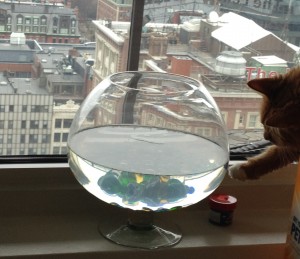 new year is here, and with it, a new set of literary goals. Last year, I was lost in writer’s block and work stress, amounting to a little reading and even less writing. While not one to make New Year’s Resolutions (I prefer to make them on my birthday, instead), when looking back at 2014, I figured it might be time to step out of my norm and post some resolutions.
new year is here, and with it, a new set of literary goals. Last year, I was lost in writer’s block and work stress, amounting to a little reading and even less writing. While not one to make New Year’s Resolutions (I prefer to make them on my birthday, instead), when looking back at 2014, I figured it might be time to step out of my norm and post some resolutions.
- Write 5 days a week – I chose 5 instead of 7 because, knowing my schedule, 5 is more realistic, especially while in the midst of ski season.
- Read 100 books – this is a lofty goal, I know. To date, my highest achievement was reading 78 books in 1 year, and at the time, I remember feeling like I didn’t retain the information from the books. But, my to-read list is lengthy and a writer should read a lot, so I’m going to shoot for 100.
- Read more nonfiction – I am guilty of reading almost nothing but fiction. I read to escape, so popular fiction is my genre of choice. I also blame my time aversion to nonfiction on my time in graduate school, as my studies left little time for the reading of fiction. To make myself a more rounded writer, I need to expand my knowledge base. My goal is 15 nonfiction books.
- Take at least 1 writing class.
- Attend 1 writing conference.
- Write articles – As a student, I wrote a lot of nonfiction articles, and I really enjoyed it. Since leaving school several years ago, I haven’t written very many articles; instead, my focus has been on writing fiction.
- Get at least 1 freelance article published – If I can get more published, all the better. Not only will this help my credibility as a writer, but it will also be a big boon to my confidence.
- Increase my vocabulary – Being out of school, and since I’ve avoided reading nonfiction, I feel my vocabulary is not what it used to be. I often struggle to find the right word, which slows down the writing process and, in my day-to-day, makes me feel less articulate around colleagues, friends, and acquaintances. To help me with this goal, I have ordered 2 word a day calendars: 1 with archaic words and another with modern words. I love the history of language, so the archaic one will be fun and entertaining, while the modern one will be more practical in my day-to-day.
- Write at least 1 short story a month, and publish to my blog – this is something I’ve been thinking about over the past couple of months. I think it will be a good outlet when I’m feeling bogged down by my WIP.
- Finish my WIP.
Come back in a month for an update on my progress.
2015 Reading Challenge
read 2 books toward her goal of 100 books.






